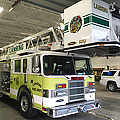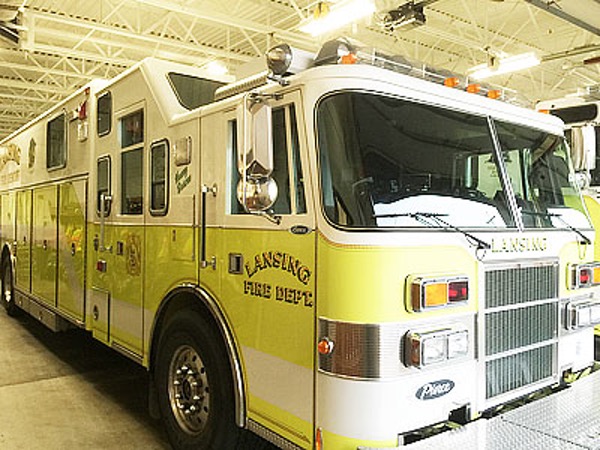- By Dan Veaner
- News
 Print
Print  Lansing Fire District Treasurer George Gesslein warned fire commissioners Tuesday that staying below the state mandated tax cap will impede their ability to maintain their fleet of fire trucks. Gesslein said that the cap would require a one cent reduction in the tax rate if commissioners choose not to override it. But he warned that the district won't have funds for future purchases if it can't maintain reserves at a sustainable level. He estimated the drop in the tax levy will cost the budget $20,000 if the cap is not overridden.
Lansing Fire District Treasurer George Gesslein warned fire commissioners Tuesday that staying below the state mandated tax cap will impede their ability to maintain their fleet of fire trucks. Gesslein said that the cap would require a one cent reduction in the tax rate if commissioners choose not to override it. But he warned that the district won't have funds for future purchases if it can't maintain reserves at a sustainable level. He estimated the drop in the tax levy will cost the budget $20,000 if the cap is not overridden."I can find a place to squeeze it out of if you want to keep to the tax cap," he said. "My major concern is that we've got some very big apparatus purchases coming up, and I need to know whether to keep them on the capital plan schedule, or change that schedule. Because we have got to have enough money to pay for these things, rather than go out and borrow."
Gesslein noted that the district's capital equipment plan calls for new fire trucks over the next four or five years. He said that if the commissioners want to keep to that replacement schedule they will be forced to override the cap.
Fire Commission Chair Robert Wagner pointed out that with the cost of trucks going up about 5% per year, the cost of fire apparatus doubles over the lifetime the Lansing department keeps its equipment. That math turns out to be conservative - last September Deputy Chief Brad George said he expects to begin working out the specifications for a new heavy rescue truck to replace the 20 year old apparatus the department currently uses. He said it would cost at least $1.3 million plus about $250,000 of tools it will carry.
Chief Scott Purcell said he plans to talk to a supplier next week to see what kind of timeline is needed to replace the heavy rescue vehicle. Meanwhile he said he and four department members will travel to Appleton, WI next week to inspect a new pumper before taking delivery of it later this year.
About $30,000 of the $35,235.55 total district bills for July was spent on apparatus maintenance. About $15,000 of that went to maintenance of the ladder truck alone. Wagner says that investing in maintenance of the trucks the department has makes it possible to squeeze decades of service from each one.
Gesslein says that if the levy continues at a rate of 1% the district's ability to pay for fire trucks will diminish. Some commissioners were only half joking when they said they will have to resort to bucket brigades if they can't afford new apparatus as the fleet ages. Granted, Gesslein and the commissioners are very conservative planners, with a 20 year capital equipment replacement plan that estimates of how much they need to raise in each of those years to pay cash for new fire trucks. But Gesslein points out that bonding new equipment means that taxpayers will be on the hook for more money in interest payments, which will mean higher future taxes.
"If we have to purchase four or five trucks in the next four or five years and we bring (the apparatus replacement reserve) down, we'll have to bring it back up," said Commissioner Darrel Rhoads.
 This heavy rescue vehicle is due for replacement next year after 22 years in service. It cost in the range of $450,000 over two decades ago, but at today's prices fire commissioners estimate it will cost about a million dollars to replace.
This heavy rescue vehicle is due for replacement next year after 22 years in service. It cost in the range of $450,000 over two decades ago, but at today's prices fire commissioners estimate it will cost about a million dollars to replace.For years the Fire District has put money in reserves so it has the cash on hand when it is needed to pay for new apparatus and equipment, and building projects. The state allows taxing authorities to override the tax cap each year, but it must be enacted in law each year. School and town officials have routinely voted to override the cap as a precautionary measure, but have avoided actually going over the cap. Gesslein said that the only repercussion for fire districts of going over the cap is political.
"The only repercussion, in my opinion, is public opinion," he said. "It takes three commissioners to override the tax cap. When I went to treasurer's training they said, 'Don't worry about the tax cap. Don't even bother building any reserves. When you need a new truck throw it in your budget and override the tax cap. Just make sure that whoever votes for it is not running for reelection.' I said, 'You guys are nuts!'"
While school and town officials have worried about repercussions from the state, such as fewer school aid opportunities, if they override the tax cap, Gesslein says there are none to fire districts.
Gesslein said he calculated next year's budget based on keeping the same tax rate of 92 cents per $1,000 of property value as was used for this year's tax rate. If the district stays below the cap, he estimates the tax rate will be 91 cents next year. That will mean about a $20,000 cut in the tax levy, which is a drop in the bucket when the total proposed levy is $1,280,668 (without the cut).
"It's a drop in the bucket, but we've got all these pieces of equipment that have got to be replaced," Gesslein. "We've got to start making sure that we save every nickel to get those done, otherwise we're going to have cash flow problems."
Gesslein says he is still waiting for final figures from the State so he can calculate the exact tax cap amount for next year's levy. He says state officials told him that figure won't be ready until later this month. A preliminary budget must be approved by September 27th.
v12i30



